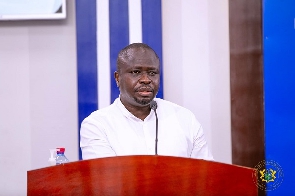Government Statistician, Professor Samuel Kobina Annim, has called for the integration of modernised data systems into national decision-making processes.
He said the Ghana Statistical Service was spearheading a data revolution to modernise decision-making processes, utilising innovative tools such as anonymised mobile phone data to tackle disaster response, poverty mapping, and election preparedness.
In his presentation at the African Statistics Day (ASD) celebration in Accra yesterday, he highlighted the transformative potential of integrating advanced data sources into national development strategies.
The ASD is an event which is commemorated annually on November 18 to deepen public awareness of the significant role statistics play in all aspects of social and economic life in Africa in particular, and in the entire world in general.
It was held under the theme “Supporting education by modernising the production of fit-for-purpose statistics.”
Prof. Annim noted that GSS in collaboration with Telecel and FlowMinder, anonymised and aggregated mobile phone data, referred to as Call Detail Records (CDRs), is now being deployed to analyse mobility patterns across urban, peri-urban, and rural areas.
He clarified that this process did not involve tracking individual calls but relies on anonymised, aggregated data sets.
“We use this data to monitor mobility trends on significant days such as elections, Christmas, and New Year, eliminating the need for costly field surveys,” he explained.
“For example, during election day, the analysis revealed a sharp drop in mobility, with the total presence in certain areas falling from 2.5 per cent to 1.8 per cent. These insights are pivotal for security agencies as they strategise to ensure smooth electoral processes.
“This is the power of modernisation, data that would otherwise sit idle with mobile network operators is now driving actionable insights for policy interventions,” he remarked.
The Deputy Government Statistician of GS, Dr Faustina Frimpong-Ainguah, reaffirmed GSS’s commitment to transforming education through innovative and fit-for-purpose statistics, with emphasiseis on the transformative role of data in shaping inclusive and quality education systems.
“Education is transformative, it uplifts communities, strengthens economies, and shapes lives. To support it meaningfully, we need data that is accurate, timely, and reflective of the realities within our communities,” she said.
She further added that the Service has also prioritised reducing the time lag between data collection and the publication of findings. “Education stakeholders can now receive actionable insights faster, enabling them to respond to challenges more swiftly,” she added.
Watch the latest edition of BizTech below:
Click here to follow the GhanaWeb Business WhatsApp channel
Business News of Tuesday, 19 November 2024
Source: ghanaiantimes.com.gh













